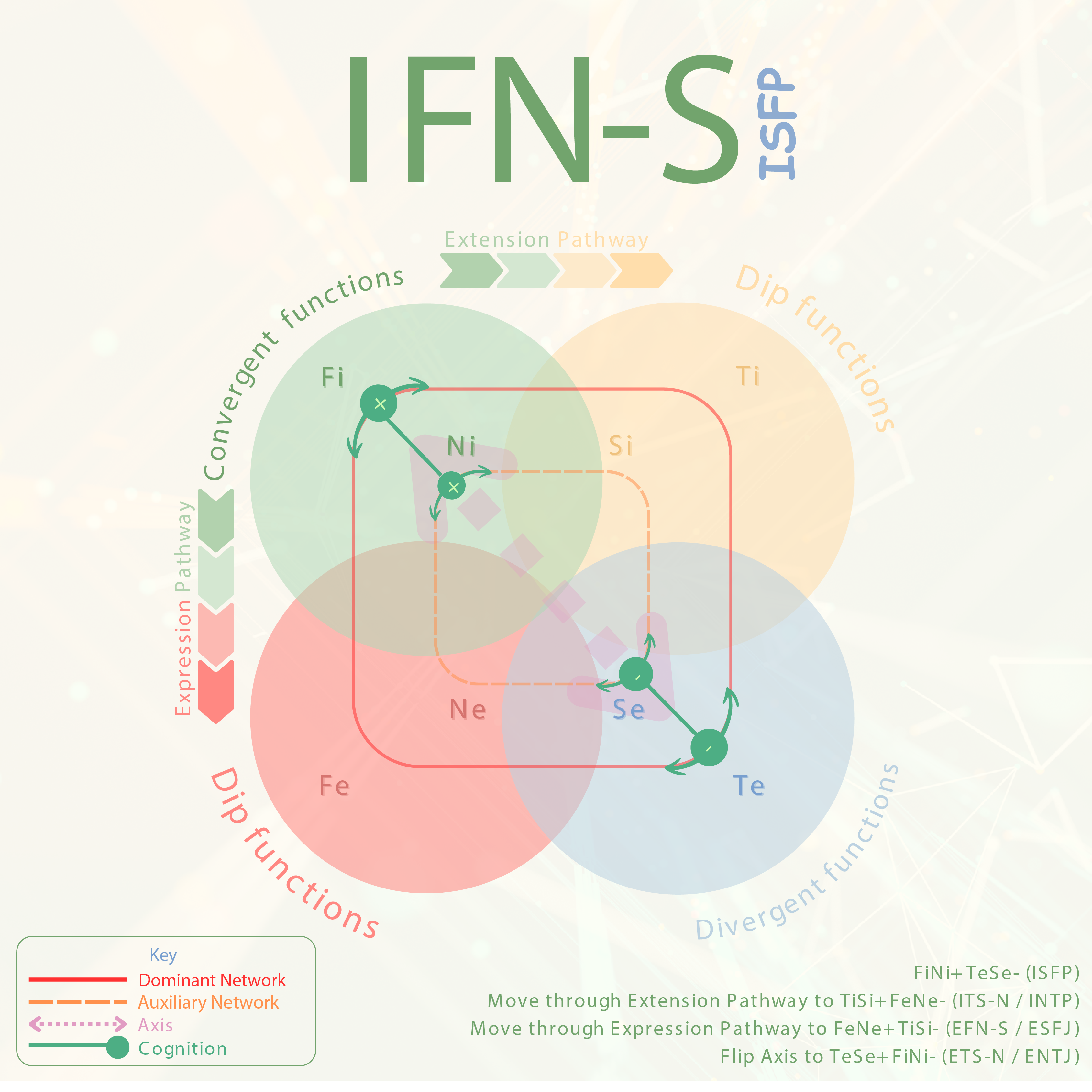
The ISFP, also known as iFN in Cognitive Personality Theory (CPT), is a deeply introspective and empathetic type characterised by their dominant Introverted Feeling (Fi), agency Introverted Intuition (Ni), authority Extraverted Sensing (Se), and oppositional Extraverted Thinking (Te). This combination makes for someone who realises emotional potential across the stimuli they are exposed to on a thematically coherent level, driven by a scrupulous TeSe- pairing measuring reality based on its ability to be impactful.
Dominant Position: Introverted Feeling (Fi)
As the dominant function, Introverted Feeling (Fi) provides the ISFP with a focus on internal emotional variables and personal values. This function excels at creating deep emotional connections and understanding the relational and existential nuances of their inner world.
How it Feels: For the ISFP, Fi dominance means constantly seeking new emotional experiences that allow them to elevate their emotional state to a desired level. They are driven to make their internal emotional frameworks secure, verifiable, and consistent, often exploring a wide range of emotions to transform over time into something larger than life.
Agency Position: Introverted Intuition (Ni)
In the agency position, Introverted Intuition (Ni) provides the ISFP with a sense of thematic cohesion and depth. Ni is fast-switching and highly sensitive to the thematic elements of their experiences, ensuring that their emotional insights are precise and accurate.
How it Feels: With Ni as their agency function, ISFPs can effectively manage and refine their internal emotional landscapes, ensuring emotions can exist independently without invalidating the existence of each other. They invest their ego in their ability to understand and control the state of their aggregate emotions, narrowing into directions that allow this state to be maintained.
Authority Position: Extraverted Sensing (Se)
Extraverted Sensing (Se) in the authority position acts as a grounding force for the ISFP, providing a counterbalance to their lofty ideals. Se instils a sense of practicality and tangible realisability, ensuring that their internal ideals can be applied effectively in the external world.
How it Feels: Se in this position can feel like an internal checkpoint, constantly ensuring that the ISFP’s ideas are grounded in reality. This function helps them maintain a clear sense of practicality and application, and also provides a source of experiential fuel as inspiration for the dominant pairing's state-transformations.
Oppositional Position: Extraverted Thinking (Te)
In the oppositional position, Extraverted Thinking (Te) serves as a delicate yet essential cognitive element. Te provides the ISFP with a sense of potential in the world around them while minimising demands upon the self. However, it can also be a source of tension as it generates systemic observations that often must be realised, as well as a strong natural state of ongoing affect.
How it Feels: Te in the oppositional position often feels like a subtle, yet powerful source of experiences driving the ISFP’s transformations. While it can be a source of internal conflict due to its sensitivity, which can result in the general avoidance of demands and pressure, it also provides valuable insights into the potential and possibilities in their environment. This function encourages them to attune and harmonise with the world around them.
Cognitive Dynamics and Dip Functions
The ISFP’s cognitive dynamics are characterised by their ability to refine and maintain their internal concepts and frameworks through Fi-Ni. This type excels at creating a stable and reliable internal world, ensuring their sense of self and understanding remains strong and consistent.
Dips:
FiNi - TiSi: Extension of large synthetic identity into traceable knowledge banks that allow the world to be understood on a critical level. This dip helps the ISFP gain a deeper understanding of why certain aspects do not hold up to their standards.
FiNi - FeNe: Expressing of large identity into the communal atmosphere to integrate with a chosen culture or clique. This dip allows the ISFP to act on their natural relational empathy and make it known to others, allowing them to feel seen and heard.
TeSe - FeNe: Developing communal bonds around shared standards and hopes for reality. This dip helps the ISFP develop and showcase their abilities in social settings, often leading to a demonstration of their skills and knowledge.
Conclusion
The ISFP (iFN) is a naturally iconoclastic type with utopian inclinations. Their dominant Introverted Feeling (Fi) drives them to create a vivid and expansive internal world, while their agency Introverted Intuition (Ni) ensures their emotional frameworks are meticulously managed. The authority Extraverted Sensing (Se) provides a counterbalance to the emotionally confident dominant pairing, ensuring practicality and tangible application, and the oppositional Extraverted Thinking (Te) ensures a quiet mechanistic intelligence and awareness of natural contingencies.
Together, these cognitive elements create a personality that excels at realising emotional potential and achieving a deep sense of harmony within themselves and their surroundings. They hope and strive for a better tomorrow and have the potential to make that future a reality for the entire world.
Illustrations by Rivka B.